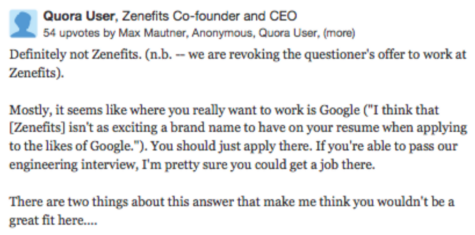Content is king… but that doesn’t really mean that’s all you need. Being a recognized expert in a particular industry is a status that everyone would love to have! That’s why your marketing and promotion activities shouldn’t be limited to sending newsletters and posting on Facebook. One thing you should definitely take into consideration is Quora.
What is Quora?
Quora is a question & answer website where questions are asked, commented on, answered, and organized by its user community. It was founded by two former Facebook employees and it’s constantly growing, with more than an estimated 100 million monthly unique visitors (March 2016).
The premise is simple – you answer a question and you get some answers. It might sound like a normal forum, or even a Facebook group. But there is a difference – the answers are very often given by influential, experienced, and intelligent individuals in business. That’s the main reason why you should be using Quora.
You might be thinking – why do I need Quora when I have Google or Wikipedia? Well, just keep in mind that on the first page of Google, results from Quora are appearing more and more often.
For who is Quora?
- For marketing and sales professionals, for promoting services in a specific way (both B2B and B2C).
- For Content Marketers to promote their content, or to find some inspiration.
- For CEOs and management board, for branding purposes.
- For influencers and bloggers, for building recognition.
- Actually… it’s for everyone. You can find and give answers, as well as learn a new thing or two.
What are the benefits of Quora?
- It’s a great site for personal branding. By answering questions, you build your personal brand, recognition, and work as an expert. It can lead to increasing conversions on your website, unique collaborations, or newfound interest in your products and services.
- Quora seems to play a huge role in getting customer feedback. You can ask a lot of questions and get valuable answers from people who could potentially start using your services. It’s a great touchpoint, as you can also ask further questions and give direct answers about your business.
- Quora is the well of inspiration. Get insights straight from the experts in any industry – e.g. in marketing, you’ll get answers from people working client-side and agencies, all alongside influencers like Gary Vaynerchuk’s.
- You can put links in your answers, so you can promote your own pieces of content. Be careful though, as Quora and other users don’t like spammy posts! Be sure that things you publish add real value. Thanks to this, Quora can become an efficient and essential source of traffic, along with achieving other business goals.
- Improving your language skills! Even if you’re an English native speaker, you can still learn a lot of new definitions or technical info that your business could use. For non-native speakers, Quora might even be better than courses at a language school.
- The mechanism of upvoting and downvoting ensures that only the best quality content is offered to users. No space for pushy advertisements, selling, unattractive content, or something that doesn’t really answer the question – improving the overall experience.
- Expanding your knowledge from similar industries… or something totally different as Quora has a lot of topics to offer.
Get deep insights, identify your strengths and weaknessesSign up
What are the limitations and problems you need to face?
- Quora is getting more and more popular, so it’s getting harder to stand out from the crowd. That means more time and effort from you.
- You need to think twice about your questions and answers – everything is public! There was an instance where an engineer asked Quora what job to take between two offers, to get some helpful answers. He claimed that he regarded one of the offers as a “temporary” job on the way to a career at Apple or Google. Unfortunately, one of the answering users was the CEO of this company offering the job… and his answer you’ll find below. (more details HERE)

- Quora is very sensitive to spam and promoting content in an inappropriate way. That means you need to choose the right words and cleverly advertise your services (if that’s what you want to do!).
- Struggle with organizing your feed. Questions from topics you follow can be mixed with some random answers, and you can’t do much about it.
Do you have to start from scratch? Find out how!
- Fill in your profile – Fill in all the necessary information about your work. It’s not a cover letter though – it’s your bio. So include only the most important info… Just don’t forget to add some of your personality to it! Remember about your credentials & relevant highlights section, links to your social media profiles, and where to contact you. Let your profile be your business card.
- Detail your experience in your profile – Let people know what areas you’re experienced in so they can request answers from you or ask you privately about doing business together.
- Find some topics to follow and answer questions – Look for anything that concerns your brand, competitors, and industry.
- Don’t be scared of upvoting – You can be upvoted back, and it’s always nice to appreciate a valuable piece of content. And an ‘upvote’ on Quora is far more valuable than a ‘like’ on Facebook.
- Follow some influencers – Not only because they might follow you back, but also so you can keep up with them and the wisdom they share.
- Add a Quora badge to your website and social media platforms to be even more visible.
- Use the ‘most popular topics’ on Quora to see what is trending and where you can share your input.
- Use UTM tags in your questions and answers, so that tracking their results in Google Analytics is easier and quicker.
Are you on Quora? If not, we hope that our article was informative and helpful and we’ll see you there in the near future – you can always look for Sotrender and follow our crew on Quora (the author of this post is there as well!)







